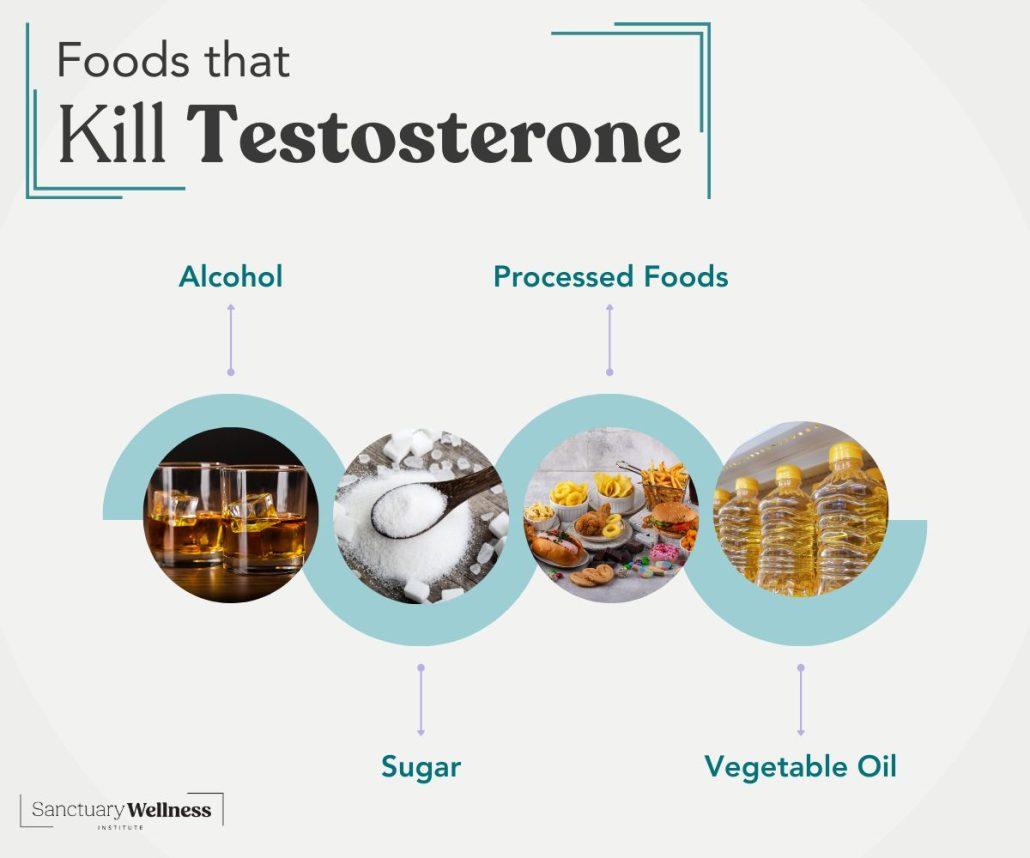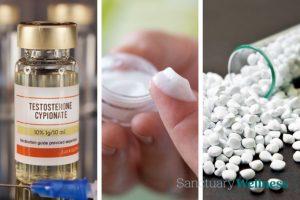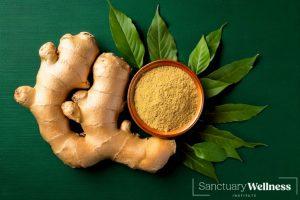- John DiBella
- Published: November 6, 2024
- Fact-checked by Dr. Desiree Granados

Testosterone is a crucial hormone for men’s health, influencing everything from muscle mass and energy levels to mood and sexual health. While age and genetics play a significant role in testosterone levels, lifestyle factors like diet can either support or hinder testosterone production.
Understanding which foods may negatively impact testosterone can help men make more informed dietary choices, especially those managing low testosterone or considering testosterone replacement therapy. Here’s a breakdown of foods to avoid for optimal testosterone health.
How Diet Impacts Hormone Balance
Nutrition is central to hormone health. Certain nutrients, like zinc, magnesium, vitamin D, and healthy fats, are necessary for testosterone production and maintaining balance in the endocrine system.
For example, foods rich in lean proteins (such as chicken, fish, and lean cuts of beef), healthy fats (like those from avocados, nuts, and olive oil), and micronutrients (including magnesium and vitamin D from leafy greens and fish) support the body’s hormone production.
Making deliberate choices about what we consume can help ensure testosterone levels remain within an optimal range. Unfortunately, certain foods may do just the opposite, hindering hormone production.

Foods That May Lower Testosterone
Knowing which foods to avoid is key to supporting hormone health. Here are some common foods and ingredients linked to lowered testosterone:
Alcohol
Excessive alcohol consumption can negatively impact testosterone production. Chronic alcohol intake is known to interfere with hormone synthesis, as the liver prioritizes metabolizing alcohol over producing testosterone.
Alcohol can also increase the production of estrogen, a hormone that directly opposes testosterone, further diminishing testosterone levels in the body. Additionally, alcohol may damage the cells within the testes responsible for testosterone production, leading to a prolonged decrease in hormone levels.
Excessive Sugar
High sugar consumption has been shown to increase insulin levels, which can disrupt hormone balance and lead to lower testosterone levels over time. One of the most significant culprits in modern diets is sugary sodas, which contain large amounts of added sugars and can cause insulin spikes that may negatively impact testosterone. Limiting sugary drinks and opting for whole foods can be a positive step toward balanced hormones.
Excessive Desserts & Processed Foods
A study published in the National Library of Medicine highlights how diets high in processed foods, desserts, and refined sugars may predict lower testosterone. The study puts forth that “a high consumption of bread and pastries, dairy products, and desserts, eating out, and a low intake of homemade foods, noodles, and dark green vegetables) independently predicted hypogonadism” Consistently consuming these foods may increase the risk of hypogonadism, a condition marked by low testosterone levels.
Certain Fats
Not all fats are created equal when it comes to hormone health. Studies suggest that trans fats, commonly found in processed and fried foods, can lower testosterone levels and impair overall health. Likewise, diets high in omega-6 fatty acids (present in many vegetable oils) may promote inflammation, which could indirectly lower testosterone.
While polyunsaturated fats, in moderation, can be beneficial, a diet overly high in these fats—especially if replacing healthier fats like monounsaturated fats—may negatively affect testosterone.
Wondering if you might have low testosterone? Take our quiz to find out!
Diet Tips for Supporting Testosterone Health
- Focus on Whole Foods: Opt for a diet rich in whole foods, including vegetables, fruits, lean proteins, and whole grains. Whole foods not only support hormone health but also offer sustained energy and better overall nutrition.
- Incorporate Healthy Fats: Healthy fats, such as those found in avocados, olive oil, nuts, and seeds, play a crucial role in hormone production. Including these in your diet can help support testosterone synthesis.
- Moderate Alcohol and Sugar Intake: Reducing alcohol and sugary drinks in your diet can help maintain stable insulin levels, supporting better testosterone balance.
- Seek Professional Guidance: If you’re experiencing symptoms of low testosterone, such as fatigue, low libido, or mood changes, it’s worth speaking with a healthcare provider about possible causes and treatment options, including diet and hormone therapy.
Conclusion
Diet plays a substantial role in hormone health. Avoiding foods that may lower testosterone, such as excessive soy, sugar, processed foods, and unhealthy fats, can support balanced hormone levels and overall well-being. For those with low testosterone or who are already undergoing testosterone replacement therapy, understanding which foods to avoid can prevent counterproductive effects.
The Sanctuary offers comprehensive support for men’s health, with options like TRT and guidance on optimizing hormone health. With the right dietary and lifestyle choices, you can better support your testosterone levels and enjoy improved health and vitality.
Frequently Asked Questions
Is soy bad for testosterone?
Soy-based foods, such as tofu, soy milk, and edamame, contain phytoestrogens, plant compounds that mimic estrogen in the body. Some studies suggest that consuming high amounts of soy could potentially reduce testosterone levels, although the research remains mixed. While occasional consumption is unlikely to be problematic, men with low testosterone might consider limiting soy intake to avoid potential risks.
What foods are good for testosterone?
Many studies suggest that some foods can naturally boost testosterone, such as garlic, shellfish, fatty fish, leafy greens, cruciferous vegetables, cocoa, avocados, specific herbs, egg yolks, and olive oil. These foods provide essential nutrients like zinc, magnesium, antioxidants, and healthy fats, all beneficial for hormone regulation.
How bad is alcohol for testosterone?
Excessive alcohol consumption lowers testosterone by damaging Leydig cells, disrupting hormone release, increasing cortisol, producing testosterone-blocking ethanol, raising estrogen, and impaired liver function. This can lead to fatigue, reduced libido, and weakened muscles. The CDC recommends no more than 2 drinks per day for men, but men who struggle with Low T might consider taking even more caution with alcohol.
How we reviewed this article:
- Jayne Leonard (2024). Best foods for increasing low testosterone
https://www.medicalnewstoday.com/articles/323759#summary - Daniel Yetman (2020). How Alcohol Affects Testosterone
https://www.healthline.com/health/how-alcohol-affects-testosterone - Liang Chen, Yu-Mei Xie, Jian-Hao Pei, Jian Kuang, Hong-Mei Chen, Zhong Chen, Zhong-Wen Li, Xiao-Ying Fu, Long Wang, Shui-Qing Lai, Shu-Ting Zhang, Zhi-Jiang Chen, Jin-xin Lin (2018). Sugar-sweetened beverage intake and serum testosterone levels in adult males 20–39 years old in the United States
https://pmc.ncbi.nlm.nih.gov/articles/PMC6015465/. - Tzu-Yu Hu, Yi Chun Chen, Pei Lin, Chun-Kuang Shih, Chyi-Huey Bai, Kuo-Ching Yuan, Shin-Yng Lee, Jung-Su Chang (2018). Testosterone-Associated Dietary Pattern Predicts Low Testosterone Levels and Hypogonadism
https://pmc.ncbi.nlm.nih.gov/articles/PMC6266690/ - Jon Johnson and Molly Burford (2024). Can foods lower testosterone?
https://www.medicalnewstoday.com/articles/325186#certain-fats
Current Version
November 06, 2024
Written By
John DiBella
Fact-checked By
Dr. Desiree Granados
Editorial Process
Our Editorial Process

John DiBella is the co-founder and CEO at The Sanctuary Wellness Institute. His goal is to foster healthier lifestyles to improve individuals’ quality of life and health span through online medical and non-medical services. When he’s not writing health & wellness articles for The Sanctuary, he enjoys hiking, camping, surfing and sailing.







